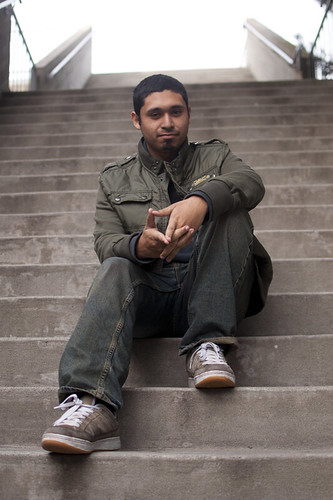
David Quintana is not an overly anxious man, but even he worries about the future of his education. In the face of impending and threatening budget cuts, he attempts to maintain a calm and cool demeanor but also realizes the magnitude of his situation.
Quintana, 19, has been through all the loops that budget cuts have thrown into education. Originally a student at Sonoma State for a year and a half, he was forced to leave when competing with fifth-year seniors who snagged the last spots of general education classes limited by budget cuts. Currently a student at City College of San Francisco, he wants to transfer to SF State and hopes to get the classes he needs to major in international studies.
As the child of two immigrants from small Mexican cities who were never allowed to pursue education past a middle school level, Quintana said he knew the values a good education could have. With five-year-old younger brother and a sister in high school, Quintana wants to set a good example for his siblings to follow into college.
“My entire family is dedicated to making sure that we, their children, have the best opportunities,” he said. “They had to learn things through life, which is valuable to some, but also the theory and the skills that come with higher education only help to enhance that.”
There was a light in his eyes as Quintana described the drive that his parents and their history gave him. He said that if and when he could get through an educational system affected by budget cuts, he would be the first one in his immediate family to get a college degree. He worries that this journey will be interrupted by the massive budget cuts he already experienced at Sonoma State.
Quintana said there is a lot more to college and the skills you gain besides simply education. He said that budget cuts threaten aspects of college that promote the opportunity to grow in society.
“Being involved with the community is extremely important because one of the most important reasons for entering college is to learn skills which will later be applied in a community,” he said. “University used to help train rulers to govern society, then for the elite to be able to participate in business, but now recently in history, it allows all people to strengthen and hone their abilities to hopefully benefit society.”
Quintana has been involved in many community efforts such as building a public urban park in a neighborhood in Roseland, Calif., which was run-down, and also supporting a project called “Safe Routes to School,” in Santa Rosa, Calif., that ensures kids have safe paths to school that aren’t plagued with too many cars or other factors.
He knows that there is a world beyond his education, and he has taken the time to look at the big picture and his personal goal. The way he looks at it, it’s all about cooperation with one another.
“One focus I do have is that I want to do good for society: to contribute, and do right by myself,” he said. “All I expect is for the government to help us achieve that goal, because we are a big part of society. Help your fellow sister or brother.”
Quintana said that giving back was actually one of the big reasons he wanted to gain a good education, so he could have something to offer the world. He said that, unfortunately, he felt budget cuts did a lot to hamper that spirit of charity.
“That is kind of a sick joke with budget cuts,” he said. “It makes people less likely to give back and have less ability to contribute to the society which will only drag it down. It’s a vicious cycle that needs to be stopped or corrected.”
But rather than taking budget cuts as a chip on his shoulder and just giving up, Quintana said that it is up to the affected party, the students, to stand up and do something about it. Quintana marched with approximately 100 students on the March 2 Day of Action to protest the budget cuts and explain how they could damage his future.
“Students can begin by educating themselves and being aware,” he said. “Also, they can follow up how their schools and systems work and begin to put pressure on the body making decisions. This is a democratic society that doesn’t just stop at the ballot, but begins with awareness and continues to participation.”
Quintana said that getting the word out to students and encouraging them to protest is the most effective way to make change.
“Be aware,” he said. “Strive for what you want, and believe and help one another. That’s probably the best thing I can say to anyone reading this article.”




Chris • Mar 10, 2011 at 2:11 pm
SFSU has a lot of horrible teachers making top dollars because of union rules. That’s besides all the administrations costs, even the Presidents 350K a year salary. And then on top of this all the STUPID ads for CEL on the back of buses, posters across town. We need to get the crap out of SFSU. And then education can continue normally. Otherwise we just have third rate education and desperate people competing to get in them. And BTW protesting has done NOTHING in a Long time. Especially since protests are limited to public sidewalk, two squares sidewalk width along 19th. You want action? Take legal action. I am and I’m getting my money back from SFSU. And if you can’t get your money back, do something to risk going to jail, you’ll send a louder message than any microphone or sign will.